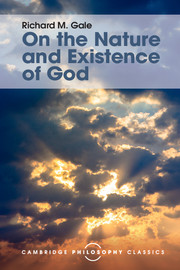7 - Cosmological arguments
from Theological arguments
Published online by Cambridge University Press: 05 July 2016
Summary
One of the fondest memories for most of us is the time we nailed our parents with the regress of why-questions, the crowning point of which was when we triumphantly asked, “Yeah, so who made God?” At this point we were told to go play marbles in traffic. Little did our parents realize that the cosmological argument could have served as Jim Dandy to the rescue; for it demonstrates that our initial explanatory demand must ultimately terminate with a self-explaining explainer, in which a self-explaining being is one whose existence is entailed by its nature or essence, that is, one for whom there is a successful ontological argument.
But if there is a successful ontological argument, as the cosmological argument supposedly proves, why screw around with the cosmological argument? Why not go right for the jugular and give this ontological argument, thereby having an end to the matter of whether God exists? This was one of Kant's objections to the cosmological argument. This charge of redundancy misses the mark, since there could be a successful ontological argument even if we were unable to give it. Thus, we could know on the basis of the cosmological argument that there is a successful ontological argument and thereby that God exists, but not be smart enough to give it.
The most telling objection that can be lodged against the cosmological argument is that it is impossible for such a being to exist, thereby showing that this argument's conclusion is necessarily false. Any argument for an impossible conclusion, to say the least, leaves something to be desired, whether in the way of validity or soundness. This will be the ground on which every version of the cosmological argument will be attacked. The points made in the Chapter 6 criticisms of ontological arguments will form the basis of my polemic.
Before getting down to a detailed analysis of different versions of the cosmological argument, it will be helpful to describe their generic nature. A cosmological argument is made up of three components: (a) a contingent existential fact, (b) an explanatory argument, and (c) a version of the principle of sufficient reason (hereafter PSR). It begins by demanding an explanation for the existential fact in (a) or some fact that it entails in conjunction with certain other premises or assumptions.
Information
- Type
- Chapter
- Information
- On the Nature and Existence of God , pp. 204 - 243Publisher: Cambridge University PressPrint publication year: 2016
